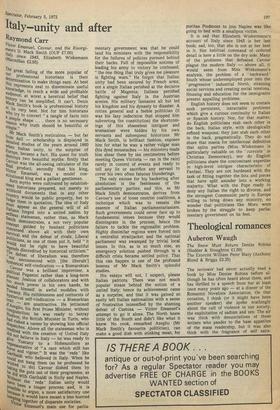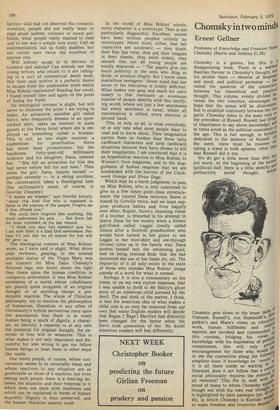Theological romances
Auberon Waugh
The Snow Must Return Denise Robins (Hodder & Stoughton £1.50) The Exorcist William Peter Blaty (Anthony Blond & Briggs £2.25) The reviewer had never actually read a book by Miss Denise Robins before although he has often heard about them, and has thrilled to a speech from her at least once many years ago — at a dinner of the Romantic Novelists Association. On that occasion, I think (or it might have been another speaker) she spoke scathingly about the cult of violence in our society, the exploitation of sadism and sex. The air was thick with denunciations of those writers who pander to the base appetites of the mass readership, but it was also thick with the fragrance of self satis faction: God had not deserted His romantic novelists, people did not really want to read about sadism, violence or moral pollution, what people really wanted to read and to see was a simple love story. Call us sentimentalists, call us fuddy duddies, but our novels earn twice the royalties of anyone else. Will nobody speak in in defence of violence and sadism? Can nobody see that young writers who return to it are indulging in a sort of commercial death wish, that their only motive is a pathetic desire to escape from the unalterable truth which Miss Robins represents? Reading her novel, I found myself time and again on the point of losing my Faith. Its theological content is slight, but will serve to illustrate the point I am trying to make. An attractive, sensible girl called Steve, who frequently dresses in an opennecked shirt, takes an interest in some guests at the Swiss hotel where she is employed as something called a hostess. This is not, as one might suppose, a euphemism for prostitution. Steve has never been promiscuous, but the handsome forty-year-old millionaire widower and his daughter, Dana, interest her. "She felt an attraction for him she had never before felt for any man." Then when the girl, Dana, injures herself — perhaps severely — in a skiing accident, the conversation takes a theological turn (the millionaire's name, of course, is Greville Chesney): "It makes me wonder," said Greville bitterly, " about this kind God who is supposed to listen to the prayers of His people; Forgive me if this offends you."
She could have forgiven him anything. She -.:culd understand his pain . . . But Steve felt the must comment on his last remark.
" I think you may feel resentful now but I am sure there is a kind God somewhere. Perhaps it's just that we all misuse the free will He gave us.
The theological content of Miss Robins' work, as I have said is slight. What drove your reviewer, gasping, to the nearest available statue of the Virgin Mary was not concern for Miss Dana Chesney's fictional legs, nor doubt about the light they threw upon the human condition in conspectu aeternitatis. It was Miss Robins' revelation of a world whose cohabitants are plainly quite incapable of an original thought or of anything except a pre dictable reaction. The whole of Christian philosophy, not to mention the philosophies of humanism, liberalism or any other of Christianity's hybrid derivatives rests upon the assumption that there is in every human being a spark of dignity, a charac ter, an identity, a capacity or at any rate the potential for original thought, the ex ercise of free will or whatever. This is what makes it not only imprudent and distasteful but also wrong to gas our fellow human beings or treat them in other ways like cattle.
One meets people, of course, whose conversation seems to be invariably banal and whose reactions to any situation are as predictable as those of a machine, but even among such people there is a time-lag be tween the situation and their response to it which does not exist with machines and which can be explained in terms of human stupidity. Dignity is thus preserved, and the human character asserts itself. In the world of Miss Robins' novels, every character is a stereotype. That is not particularly disgraceful. Excellent novels have been written peopled entirely by stereotypes. Never mind, either, that her characters are automatic — they blush, their fine lips twist, they put their tongues in their cheeks, they smile widely, they remark that not all young people are totally depraved — "The papers give too much publicity to the ones who drug or drink, or produce illegits. But I know some marcellous teenagers.' Never mind that her sense of the ridiculous is totally deficient. What makes one gasp and reach for one's rosary is that obviously an enormous number of people identify with this terrifying world, where not just a few sentiments but every sentiment is banal, where all conversation is stilted, every emotion is second hand.
This, so help us all, is what everybody, or at any rate what most people want to read and to know about. Their imagination carries them no further than these tatty cardboard characters and tatty cardboard situations because they have chosen to kill their imagination. I am convinced that it is an hyperbolical reaction to Miss Robins, to Woman's Own magazine, and to the sluggishness of human response that we are bombarded with the horrors of the Clockwork Orange and Straw Dogs.
Which may be a harsh judgement to pass on Miss Robins, who is only concerned to give us a few hours good clean entertainment: the injured Dana recovers; Steve is kissed by Greville twice, and we must suppose produces babies and lives happily ever after; Rupert, Steve's charming rotter of a brother, is thwarted in his attempt to marry Dana for her money when a former girl-friend called Leggie (really called Alison after a Scottish grandmother who would have turned in her grave to see Leggie in her mini-skirt and see-through blouse) turns up in the family way. Dana pushes herself into the swimming pool, and on being rescued finds that she has recovered the use of her limbs etc, etc. The depravity of it all only exists in the state of those who mistake Miss Robins' image parody of a word for what is normal.
Perhaps it is also a commentary on the times, or on my own stylish response, that I was unable to thrill to Mr Blatty's ghost story of an American child pursued by the devil. The sad truth of the matter, I think, is that the American idea of what makes a child cute is so very far removed from our own that many English readers will decide that Regan (` Rags') MacNeil had distinctly been changed for the better when the Devil took possession of her. No doubt American readers will feel differently.











































 Previous page
Previous page